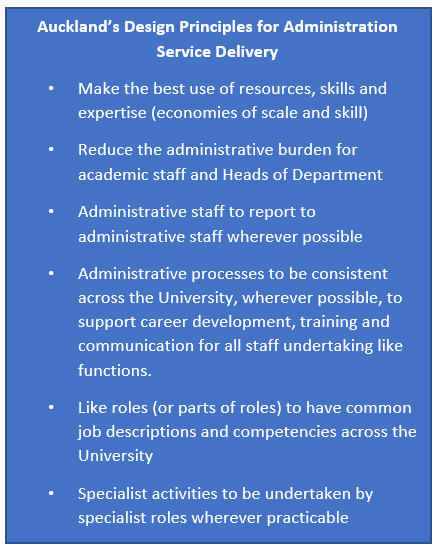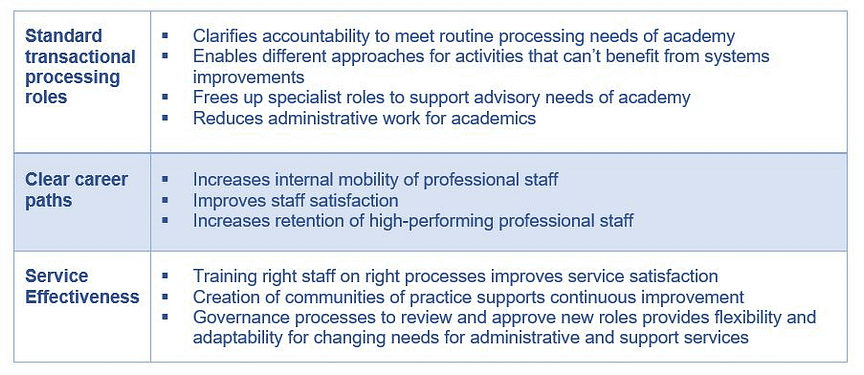This article is the first in a two-part series highlighting how the University of Auckland has used conscious role redesign to improve performance of administrative services. This first article covers the process and aims of the redesign effort and key success factors. The second article will talk about how this smart transformation has supported Auckland’s response to COVID-19.
Support services roles in academic units are often determined at the faculty and department level to meet local needs. Though useful in the short-term, over time this approach can lead to the proliferation of unique roles across an institution. The University of Auckland, for example, found that ~1,200 positions across its faculties had been created with ~800 different titles and position descriptions. Similar reviews in many other universities involved in the UniForum program have found comparable numbers of uniquely defined roles. Ultimately this lack of conscious role design can result in a number of consequences:
- Large numbers of local roles built to support a wide array of administrative needs often results in ineffective and high cost delivery (someone helping with an issue they deal with once a year is likely to take longer and have a higher error rate than someone more trained and practiced in the area)
- A wide range of non-standard jobs across the university results in a lack of clear career paths as well as a lack of clarity on who needs what training to develop professionally. This can in turn lead to staff retention issues and higher costs to replace roles
- A lack of standard roles can also be a strategic liability when a university is looking to make transformational change. For example, implementing enterprise systems requires the adoption of standard processes and training to realize the full benefits
Auckland, through their conscious role redesign initiative, has been able to address these challenges and demonstrate that administration and support roles can be designed and sustained to meet the needs of academic units in a way that improves service effectiveness and staff satisfaction.
Roles formed to meet local routine transactional processing needs

Auckland formed roles to meet the local needs of academic units for routine day-to-day transactional work such as recruitment and reappointment services, financial accounting and reporting, and accounts payables and receivables processing. All of these are areas which benefit from standardization and automation at a university. With full knowledge of the opportunity, Auckland undertook a robust redesign process aimed at a few explicitly defined benefits around engagement, satisfaction, cost, and re-investment in the academic mission. In addition to these KPIs, a clear set of design principles were defined (see box) which could be used to create program focus, evaluate design choices, and communicate to the broader community.
To optimize outcomes Auckland started with establishing the University’s Shared Transaction Centre with accountability for high-volume routine transactional activities such as invoice processing and travel administration. These activities benefit from bringing together subject matter experts, managers, leaders and technology into one administrative unit. Standard roles and processes enable Auckland to train the right people on the right processes. To meet the need of academics and professional staff, Auckland’s Staff Service Centre provides face-to-face, telephone, and online support in areas ranging from room bookings, purchasing, HR, expense management, and teaching administration. The experts in the Staff Service Centre also provide an extensive knowledge base of articles for academics and professional staff.
The creation of roles specifically designed to deliver transactional services also had the impact of greater role focus for advisory roles such as more dedicated Finance business partners embedded within academic units.
With a strong central transactional service established, Auckland utilized four key dimensions in creating standard administrative models which could be standardized within each Faculty. These were:
1. Consultation and collaboration
Auckland created a Faculty Owners Group, consisting of Directors of Faculty Operations of each faculty, supported by a core project team, faculty subject matter experts and HR experts with specific skills in role redesign. Together, they produced a detailed taxonomy of core activities and skills in consultation with faculty and professional staff. They created standard roles to service local needs thereby reducing 410 different professional staff titles to 36 common to all faculty roles and 9 faculty-specific roles.
2. Common job descriptions, titles, and competencies
Common job descriptions, titles and competencies were created for like roles across the university to provide greater role clarity in terms of performance expectations, responsibilities, and accountabilities. Specialist activities were designed to be undertaken by specialist roles wherever practicable to support recruitment and retention of skilled staff and to provide sufficient flexibility in design to accommodate unique faculty needs.
3. Organizational structure and reporting lines
To ensure clear career paths for professional staff, consciously designed organisational structures facilitated staff development and engagement. The redesigned structures also provided opportunities for career advancement within faculties and across the university. Wherever possible, professional staff reported to professional staff to ensure effective career pathways, career development, and future leadership pipelines. The creation of one management model for all faculties across the university enabled the implementation of consistent leadership development programs and role-based training for all professional staff.
Placement of roles within the university (e.g. faculty-based, central functional units, faculty-level consolidated departments and shared transaction centres) was determined through the design and consultation process.
4. Communities of practice
Communities of practice were established, consisting of professional staff leaders from the faculties and central units to share knowledge and to develop and implement continuous improvement practices for standard transactional processes delivered at the faculty level. Accountability for governance and oversight for each key function rests with the relevant community of practice. Policies and guidelines are agreed to by all faculties to prevent a return to the previous state. All new roles proposed by any faculty are assessed and approved by the relevant community of practice before becoming a university-wide standard. In this way, the community ensures that new roles are not designed to fill gaps in service delivery but are designed to meet incremental needs for support.
"Getting it right" clarifies career paths, improves satisfaction and increases retention
Auckland’s role redesign experience shows the value that conscious role redesign can bring to faculties and academic and professional staff as presented in Table 1 below.

Table 1. Benefits of role redesign
The result of this transformation has seen Auckland continue to deliver highly efficient services while achieving strong satisfaction results from both professional and academic staff. Auckland’s degree of centralization and use of generalists differs from other top performers in the UniForum group highlighting that there is no ‘one size fits all’ approach when it comes to successfully transforming administrative service delivery. What is key is investing in the right analysis and conducting sufficient consultation on campus to make conscious choices that work for the institution as a whole.
This article was written by Haseeb Kamal, Managing Director Canada, based on interviews and other contributions from two colleagues at the University of Auckland: Andrew Phipps, Director of Human Resources and Andrew Creahan, Director of Organisational Performance and Improvement.
